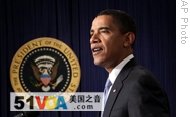Pentagon
28 January 2009
President Barack Obama visits the Pentagon today to meet with top military officers, and a spokesman says the wars in Iraq and Afghanistan will be at the top of the agenda.
 |
| President Obama |
They are known to have particular concerns about the stress that the two long wars have placed on their forces and about spending plans for new high-technology military equipment. But Pentagon Spokesman Bryan Whitman points out the generals and admirals are also experienced combat officers. Army chief, General George Casey, was the commander in Iraq from mid-2004 to early 2007. Whitman expects the discussion to focus on the wars.
"I would expect that coming over to the Pentagon, the two most important issues, obviously, that face our country, from a security standpoint, are the conflicts that we are in," he said. "And so I would expect that Afghanistan and Iraq would be highlights of the discussion today."
President Obama faces several important decisions about the wars. He has said he wants most U.S. combat troops out of Iraq in 16 months, and he has expressed support for a plan to sharply increase the U.S. troop presence in Afghanistan.
But most of his statements on those issues came during the campaign and the transition. Now, in the president's second week in office, Defense Secretary Robert Gates, who has been in office for two years, is presenting him with detailed information and personal briefings as he moves closer to having to actually decide where to deploy his forces and what risks to accept.
"It has been my approach, since I took this job, that on all these major decisions I believe it is important for the president to hear directly from his senior military commanders," Gates said. "And so in every one of these decisions I have structured a process so that the president hears from the ground commander, who would be General Odierno, the CentCom [Central Command] Commander, General Petraeus in this case, and the Joint Chiefs of Staff, and then from the Chairman [of the Joint Chiefs] and myself. President Obama has agreed to that same kind of approach."
The service chiefs understand the needs of the combat commanders, but are eager to ease the stress of repeated deployments in the war zones.
Their colleagues in the field - equally senior officers - recognize the stress on the force, but are more concerned about moving too quickly with the Iraq withdrawal, potentially risking recent security gains. They also want to move as quickly as possible to increase the troop level in Afghanistan, where the Taliban and other insurgents have been gaining strength.
President Obama got one part of the story last week, and hears the other today. Key decisions are expected fairly soon, but no one is saying exactly when.